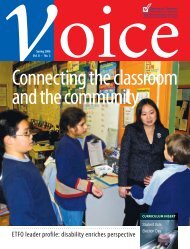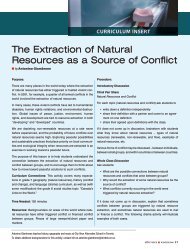Summer 2006 - The member magazine of the Elementary Teachers
Summer 2006 - The member magazine of the Elementary Teachers
Summer 2006 - The member magazine of the Elementary Teachers
Create successful ePaper yourself
Turn your PDF publications into a flip-book with our unique Google optimized e-Paper software.
Peel workshopstackle culturalbarriersby Vitusha OberoiClassroom noise, chit chat with superiors,students working in groups – <strong>the</strong>se areamong <strong>the</strong> challenges that teachers fromo<strong>the</strong>r countries face when <strong>the</strong>y step into aNorth American school.“It basically boils down to <strong>the</strong> cultural differencesbetween where our internationally trained <strong>member</strong>staught originally and <strong>the</strong> transition to teachinghere,” says Shelly Jan, president <strong>of</strong> <strong>the</strong> Peel<strong>Elementary</strong> Occasional Teacher Local (PEOT).<strong>The</strong> academic credentials <strong>of</strong> <strong>the</strong> teachers aregood: <strong>the</strong>y have <strong>the</strong>ir certification from <strong>the</strong> OntarioCollege <strong>of</strong> <strong>Teachers</strong>, but <strong>the</strong>y have been trainedfor <strong>the</strong> classrooms <strong>of</strong> <strong>the</strong>ir countries <strong>of</strong> origin andnot Ontario. “That’s where <strong>the</strong> breakdown is,” Jansays. “<strong>The</strong>y are capable <strong>of</strong> doing <strong>the</strong> job academicallybut certain things need to be adjusted.”To help bridge this gap <strong>the</strong> PEOT Local haslaunched a pilot project to help its internationallytrained teacher <strong>member</strong>s to adapt to Ontarioclassrooms.<strong>The</strong> local is conducting workshops for teacherswho are looking for guidance as <strong>the</strong>y transfer<strong>the</strong>ir skills from <strong>the</strong>ir country <strong>of</strong> origin to Canada.Members hold monthly meetings, and in <strong>the</strong>presence <strong>of</strong> an experienced facilitator discuss <strong>the</strong>problems <strong>the</strong>y face. <strong>The</strong>y keep journals and share<strong>the</strong>ir experiences as <strong>the</strong>y strive to come to gripswith <strong>the</strong> cultural differences that challenge <strong>the</strong>min <strong>the</strong>ir pr<strong>of</strong>ession here.Jan decided to focus on <strong>the</strong> special needs <strong>of</strong><strong>the</strong>se teachers after she realized that <strong>the</strong>ir teachingcredentials were being questioned becauseVitusha Oberoi is a former ETFO staff <strong>member</strong> and is a freelance writer.<strong>of</strong> cultural issues. “I would get calls from principals about <strong>the</strong> classroommanagement abilities or communication skills <strong>of</strong> <strong>the</strong> teachers. I felt it wasnot fair to our <strong>member</strong>s because what we needed to do was deal with <strong>the</strong>secultural issues.“<strong>The</strong> board is not cutting enough slack for <strong>the</strong>ir adjustment and <strong>the</strong>teachers <strong>the</strong>mselves don’t know what to expect when <strong>the</strong>y come into <strong>the</strong>classrooms in Canada,” Jan says.Veena Navgiri, a half-time ESL teacher, says that a crucial issue faced by internationallytrained teachers in <strong>the</strong> initial stages relates to <strong>the</strong> amount <strong>of</strong> freedomenjoyed by students in <strong>the</strong> class. Navgiri is from Gujarat, India and was a universitypr<strong>of</strong>essor before migrating to Canada. Her class <strong>of</strong> 80 students used tobe focused, would never challenge her, and above all, was mostly quiet.“In India, we always want our students to keep quiet while we do <strong>the</strong>teaching. I never had to think about discipline or classroom management.When I started teaching here, I would get anxious if <strong>the</strong> noise levels in myclass rose,” she says.Navgiri says with experience and discussing <strong>the</strong> problem with her colleagues,she has learned to adjust to her new classrooms. “<strong>The</strong>se workshops have helpedme realize that I am not alone and o<strong>the</strong>r teachers also face a similar problem.”“<strong>The</strong> concept <strong>of</strong> group work in <strong>the</strong> classroom was new to me,” saysCharulata Joshi, originally from Mumbai. “How do I know any learningis going on? How do you monitor that <strong>the</strong> children are on task? <strong>The</strong> issue<strong>of</strong> who controls <strong>the</strong> classroom also baffled her. “In India, <strong>the</strong> classes areteacher-oriented. Here, <strong>the</strong> classes are more interactive.”While <strong>the</strong> English language in itself was not a problem, nuances andphrases peculiar to Canada definitely were. “I usually come across a number<strong>of</strong> Indian children in my classroom. I find that <strong>the</strong>y do not always pronounce<strong>the</strong>ir names <strong>the</strong> Indian way and correct me on this,” Joshi said.<strong>The</strong> informality <strong>of</strong> North America is ano<strong>the</strong>r stumbling block for <strong>the</strong>teachers, who have a culture <strong>of</strong> treating <strong>the</strong>ir superiors as authority figures– distant and alo<strong>of</strong>. <strong>The</strong>y hesitate to be on first-name terms with <strong>the</strong>irprincipal, won’t approach her on discipline issues until and unless <strong>the</strong>yare pushed to <strong>the</strong> wall, and won’t exchange small talk. “I see o<strong>the</strong>r teachersdiscussing <strong>the</strong> wea<strong>the</strong>r with <strong>the</strong> principal. I want to do <strong>the</strong> same but I don’tknow how,” says one <strong>of</strong> <strong>the</strong> workshop <strong>member</strong>s.<strong>The</strong> problems are many but Jan and facilitator Prem Pillay, a retired teacherwho taught in South Africa before moving to Canada, make sure that <strong>the</strong>y donot overwhelm. <strong>The</strong>y <strong>of</strong>fer advice and encouragement. “It takes you wantingto learn and not isolate yourselves in your own little groups,” says Jan.10 etfo voice SUMMER <strong>2006</strong>









